- Home
- Alex Lukeman
Solomon's Gold Page 2
Solomon's Gold Read online
Page 2
"I don't think he will," Selena said.
"Why not?"
"He'd be a fool to throw away one of the best tools he's got, and he doesn't strike me as anyone's fool. He needs the Project. Rice wasn't afraid to send us out, even when it could have blown up in his face. I think Corrigan will be the same. He'll be under a lot of pressure to take on all the crazies out there who want to destroy us. Besides, someone has to tell him the truth about what's going on. That's why Rice hired Elizabeth and created the Project in the first place."
"Assuming he wants to hear it," Nick said. "He's surrounded by opportunists who see their chance at power. They could be an obstacle."
"We'll know soon enough."
Selena stood and yawned.
"There's an express train tomorrow at seven in the morning. I'm going to bed."
She looked down at Nick, still sitting at the table, and took his hand.
"Are you coming?"
CHAPTER 3
The Jewish Museum of New York spotlighted the culture, lives, and history of the Jewish people. One of the things Director Alan Friedman enjoyed most about his job was evaluating gifts of archaeological interest donated to the museum. A recent gift had included objects from the Middle East. One of them was a sealed pot.
The pot was typical of the pre-Christian era. There wasn't anything unusual about such vessels, but this pot had something inside it. He'd decided to break the ancient seal and see what it was.
When Friedman saw what was inside, his heart had skipped a beat. With great care, he'd extracted a fragile, parchment scroll. Such finds were rare. The most famous examples were the Dead Sea Scrolls, found in a series of desert caves near Qumran, in the modern West Bank of Israel.
Friedman had struggled to reign in his imagination when he saw the ancient scroll. It was the dream of every biblical archaeologist to find an artifact that might shed light on the many unanswered questions about biblical times.
The scroll had once been tied by a thin strip of cloth. The strip had disintegrated over the centuries and the parchment had partially unfurled. A scrap of writing was visible. Friedman was expert in biblical Hebrew and Aramaic, the two most common languages of the era. From what he could see, the writing appeared to be a form of early Hebrew.
The museum was well-equipped to handle unrolling and preservation of the scroll. As a Jew, Friedman had every right to work with it. If it turned out to be to be a sacred document, such as a page of the Torah, he'd take it to his Rabbi for consultation. As it was no longer a living document but a relic, he was comfortable moving ahead on his own.
The scroll was in surprisingly good condition. Friedman expected he'd be able to translate it. But when the page was completely visible, open and flat under protective glass, he was confused. The writing looked like biblical Hebrew, but he could only guess at the meaning of an occasional word or phrase. None of it made sense.
That was when he'd thought of Selena. They'd struck up a friendship some years before at a conference on ancient Semitic languages. He'd taken pictures of the scroll and sent them on to her, with a request that she come to New York and examine the document for herself. When it came to translating the ancient languages of the Middle East, Selena's worldwide reputation put her at the top of a very small list.
Friedman looked at his watch. He was looking forward to her visit. She'd be here soon.
Almost on cue, Friedman's personal assistant came into his office. "Director, Doctor Connor is here."
"Good. Show her in, Miriam."
Selena came into the room, looking harassed. She wore a long coat against the miserable weather and black leather boots that went halfway up her calves.
Friedman was dressed in a dark suit and a white shirt with no tie. He had a round face with a full salt-and-pepper beard. A yarmulke rested on the top of his thinning hair. An old-fashioned pair of round, gold rimmed eyeglasses gave him the scholarly look of an earlier time. He rose from his desk as Selena came in.
"Selena. It's good to see you again. How was your trip?"
"It was fine, until I got into the cab that brought me here," Selena said. "If that car ever had shock absorbers, somebody must have stolen them. And the driver seemed to think he was trying out for Daytona."
Friedman laughed. "You can thank our mayor for the condition of our streets. Let me take your coat."
She handed it to him. He hung it on a rack in the corner.
"Would you like some coffee? Tea?"
"I'd love a cup of coffee, thanks."
Friedman spoke into his intercom. "Miriam? Could we have two cups of coffee please?"
"Right away, Director."
"Where was the scroll found?" Selena asked.
"Jordan. It came to the museum as a bequest from the family of Joseph Hartzmann. It was inside a pot found during an expedition he led in 1928. Hartzmann was a professor of archaeology in Germany before Hitler came to power. He taught at Heidelberg until he was fired by the Nazis. He managed to get his family out of Germany with most of their possessions. The pot containing the scroll was one of them. Hartzmann planned to join them later, but he never made it."
"What happened to him?"
"Auschwitz happened," Friedman said. "He did not survive the war."
"How awful."
"The scroll is over here," Friedman said.
He guided Selena to a table, where the scroll was framed under protective glass.
"Was it difficult to unroll?" Selena asked.
"Yes, it was. It's damaged at the bottom and part of it is missing."
"It seems to be in fair condition, up to where the lines of writing break off. I wonder what the missing portion said?"
"I wonder what any of it says," said Friedman. "I'm hoping you'll be able to tell me."
The piece of parchment was about eighteen inches long, damaged at the bottom. It was yellow and brown with age. The ink had once been deep black, but had faded to a dark brown. The entire page was covered with writing.
"I was very careful," Friedman said. "It's not the first time I've had to deal with something as fragile as this. I was a bit nervous, given that no one has seen it for more than two thousand years."
"What is your estimate of the period when it was written?"
"It's certainly pre-Christian. I've sent a small sample off to the lab for carbon dating."
Selena looked down at the scroll.
"It's biblical Hebrew," she said, "quite early. Look at how all the words run together with no spaces. That indicates early use of the language. In the best of circumstances it would be difficult to read, since there's no punctuation to separate phrases or clarify meaning. Do you have a magnifying glass handy?"
"Of course."
Friedman went to his desk and took out a large, handheld glass. He gave it to Selena. She bent over the scroll.
"It could be a dialect, which would complicate things even more. It reminds me of the original Book of Daniel, but it's not quite the same."
Friedman said, "Do you think you can translate it?"
"Not yet," Selena said. "The more I look at it, the more I think this is written in code."
"I thought it might be, but it isn't any code with which I'm familiar. Not like the Atbash code, for example."
The Atbash code was a simple substitution code based on the Hebrew alphabet. In its basic form, the code substituted the first letter of the alphabet with the last, the second letter with the second from last and so on. It had been widely used in biblical days. By modern standards, it was easily broken.
"No," Selena said, "this isn't Atbash. But it might be another kind of substitution cipher. Maybe even a double substitution. Now that I'm looking at the actual document and not a copy, I have a distinct feeling that whatever is written here is important. There's something about it...can you give me a digital scan? I want to run this by someone I know. She's a computer whiz, with access to a Cray. It will speed things up."
"I assumed you might want one," Friedman sa
id. He took a thumb drive from his jacket pocket and gave it to her.
"This is exciting," Selena said.
"You've been off the lecture circuit for a while, haven't you?"
"I was busy with other things," Selena said.
Friedman gestured at the brace on Selena's leg. "What happened to your leg?"
"Oh, I slipped on some ice."
If Friedman thought her answers were vague, he said nothing.
She glanced at her watch. "I think I should head back and start working on this. There's a train an hour from now."
"Can I persuade you to have lunch with me before you go back to Washington?"
"I'd love to, Alan, but let's make that a rain check. I want to get this into a computer as quickly as possible. As soon as I have something definite, I'll let you know."
"I'll see you out," Friedman said. He helped her on with her coat.
Later, riding back on the train, Selena thought about the scroll. It was odd, the urgency she felt about it getting it translated, almost as if something was prodding her. As if time were running out, although there was no rational reason to think so. After all, that piece of parchment had been hidden for more than two thousand years. Another day or two to understand what was written on it wouldn't make any difference.
Would it?
CHAPTER 4
Selena walked into Project HQ, Friedman's drive in her purse. Everything felt different, now that she'd told Elizabeth she was quitting the field. It wasn't that anything appeared different. Elizabeth had given her full access. Selena's security clearance was still in place. It was subtle, as if something familiar had changed. She didn't like the feeling. It made her uneasy. In spite of herself, she knew she was going to miss the excitement of the missions.
She went down the spiral staircase to the lower level. Gunfire came from the range where Nick, Ronnie and Lamont were practicing. She passed the gym and wondered how far she could take her workouts, now that she was pregnant, and for how long. She headed past the pool and the operations room to the computer room, where she knew she'd find Stephanie.
Stephanie Willits was Elizabeth Harker's deputy, one of the smartest people Selena had ever known. When Steph was a teenager she'd hacked into the Pentagon servers for the fun of it. It hadn't been the first time she'd broken through the firewalls on someone's ultra secure computer system, but it was the first time she'd been caught.
In the days that followed, it had been made clear to her how much trouble she was in. After she'd shown the grim-faced agents who'd arrested her how she'd accomplished the breach, they'd offered her an alternative. She could work for the government, or she could go to prison for a long, long time.
It hadn't been a hard decision to make. They'd given her a console and a cubicle in the gigantic black building housing the NSA, which was where Elizabeth had found her some years later.
For Stephanie, her job was a hacker's dream come true. She had the enormous power of the Project's Cray computers at her disposal and the official blessing of the government to use her skills against America's enemies.
Selena stood in front of the double glass doors leading into the computer room and placed her palm on a biometric scanner. The doors slid open with a hiss. A blast of frigid air swept over her. The four big computers inside the room used a lot of power and generated a lot of heat. Stephanie kept the temperature low and cold. Selena shivered inside her heavy coat.
Steph wore a green sweater buttoned halfway, slacks and a blue blouse. Half a dozen gold bracelets on her wrist jingled as she spun in her chair to greet Selena. She was sitting at the console in front of her favorite computer, Freddie, studying one of three monitors.
Freddie was a maxed out, modified Cray XT. Stephanie had written a program that turned Freddie into the first computer with true independent artificial intelligence. Freddie processed information by using the countless connections available to him, in a way similar to the neural connections of the human brain. Unlike humans, he never forgot anything. Through the Internet and connections to other computers throughout the world, Freddie had potential access to every bit of human knowledge that had been entered into a computer or scanned into a database by anyone, anywhere.
It was an awesome resource, by anyone's standard.
"Hi, Selena. How was New York?"
"About what you'd expect. The weather was lousy and the taxis were expensive. I was only there for a few hours. I have something with me I want you to look at."
Stephanie had a pleasant, round face, the sort of face you didn't notice unless you paid attention. She was neither beautiful nor plain. Her nose was a little too long, her eyebrows a touch too heavy. Her best feature was her long brown hair. It glowed with vitality. At the moment, it was tied up in a ponytail.
Steph had heavy bones and a solid look. Like everyone else in the Project, she carried a pistol. It went with the job, even though Steph wasn't a field operative.
Selena held the thumb drive up.
"There's a document on here written in biblical Hebrew. I'd like you and Freddie to take a crack at it."
Mounted above Stephanie's console was a large camera lens. It moved and focused on Selena. Her image appeared on one of the monitors.
Hello, Selena.
The voice belonged to the computer.
"How are you, Freddie?" Selena asked.
I am always the same, Selena. How is your leg?
"It's better. Thanks for asking."
I am curious, Selena. Have you not terminated your position? You are no longer a part of the team. Why are you here?
One of the things Stephanie had not been able to program into the computer was something approximating what humans called tact. Freddie was always direct.
"It's true I'm no longer part of the field team," Selena answered. "But I'm still working for Elizabeth as a consultant. So even though I quit, I still work here."
That is illogical.
"Yes, it is, isn't it? Freddie, I have a challenge for you."
A challenge? Is it a game? I like games. Sometimes Stephanie and I play chess or Go.
"Don't ask who wins," Stephanie said.
"Stephanie is going to insert a drive that contains a scan of an ancient scroll," Selena said. "It's written in a variation of biblical Hebrew."
The language is in my database. Translation will be easy.
"If it were easy, I would have done it myself. The writing is in code. I would like you to try and break the code so that we can read what is on the scroll."
Please insert the drive.
Selena handed the thumb drive to Stephanie, who inserted it into a port on the console.
Processing.
The scan of the scroll appeared on one of the monitors. A second monitor filled with rapidly changing strings of computer code.
"I wonder if he can do it?" Selena said.
"Want to make a bet?" Steph asked. "A buck says he solves it."
"How quickly?"
"Within an hour?"
"You're on," Selena said. "I know Freddie is good but within an hour doesn't sound doable to me."
The voice of the computer interrupted.
The coded text is similar to a section of writing found on a scroll excavated near Hebron in 1986 that has been attributed to King David. The section that is similar has not been translated.
"I hadn't heard about this," Selena said. "Why hasn't it been translated?"
The scroll and other artifacts from the excavation are under control of the Palestinian Authority. Because they are Jewish artifacts, they have been dismissed as of no importance. They would have been destroyed at the time except for the protests of prominent archaeological experts.
"Where is this scroll now?"
It is stored in the basement of Hebron University, in the city of Hebron, on the west bank of the Jordan.
"I still don't see how this helps us if the scroll in Hebron can't be read either."
I did not say that. I said that part of it had
not yet been translated.
"Okay."
Would you like to know what else is on the Hebron scroll?
Selena sighed. "Yes, Freddie, I would."
The scroll dates from the tenth century B.C.E. and is a communication between King David and one of his military commanders. It appears to have been written during the rebellion of Absalom.
"What does it say?"
It advises the commander to follow the instructions contained in the coded section.
"That doesn't help," said Stephanie.
The scroll instructs the commander to remember the City of the Potters.
"The City of the Potters?" Stephanie said. "What does that mean?"
It is a reference to the biblical city of Neta'im. Would you like the biblical reference?
"Yes."
Location at 1 Chronicles 4:23.
"Where's Neta'im?" Stephanie asked.
Neta'im is located in central Israel on the coastal plain.
"Freddie," Selena said.
Yes, Selena?
"Can you use this information to break the code?"
I have already done so. I compared the coded information on the scroll with the one in Hebron and constructed a common database. I then factored in the biblical reference to Neta'im. The names given in the biblical verses provided the key to the cipher. Translation is complete.
"Told you," Stephanie said.
"Why didn't you tell us it was complete?"
You did not ask. Would you like to know what it says?
Selena resisted an urge to throw something at the camera lens.
"Yes Freddie," Stephanie said. "We want to know what it says."
I will print it.
A sheet of paper chattered out of the printer on the console. Selena looked at it.
Isolomonkingofisraelwritethesewordseightysummershavepassedandmytimeisnearifearrehoboamwillnotholdthekingdomtogethericannottrust...
The rest of the printed translation was similar. Everything ran together, as it had when it was written.
"Freddie," Selena said, "please revise the translation to include modern punctuation."
Yes, Selena.
The printer chattered again and a new sheet emerged.

 End Game
End Game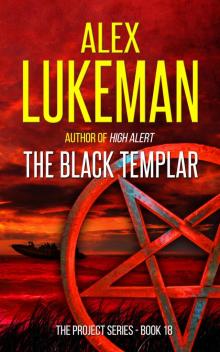 The Black Templar
The Black Templar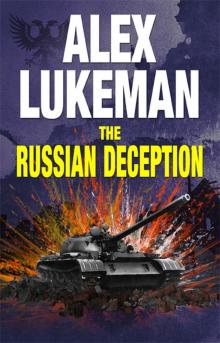 The Russian Deception
The Russian Deception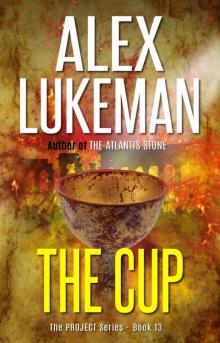 The Cup
The Cup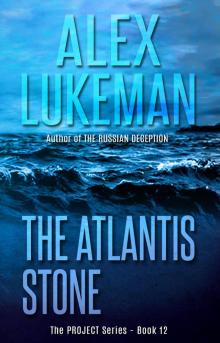 The Atlantis Stone
The Atlantis Stone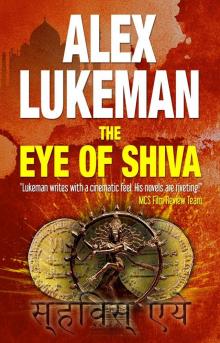 The Eye of Shiva
The Eye of Shiva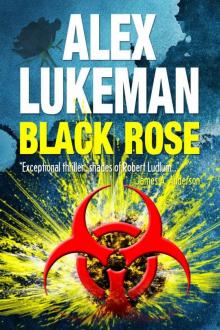 Black Rose (The Project Book 9)
Black Rose (The Project Book 9)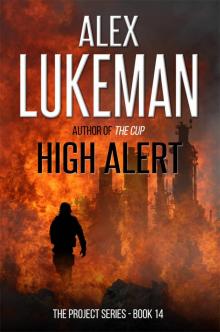 High Alert (The Project Book 14)
High Alert (The Project Book 14) Phoenix
Phoenix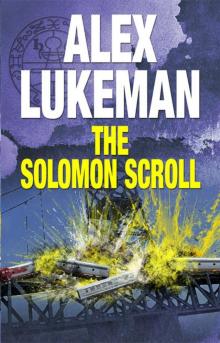 The Solomon Scroll
The Solomon Scroll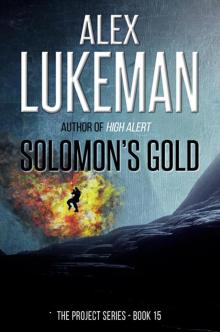 Solomon's Gold
Solomon's Gold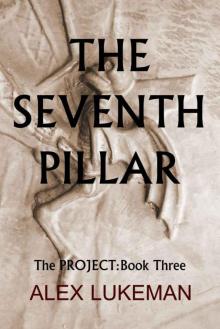 The Seventh Pillar
The Seventh Pillar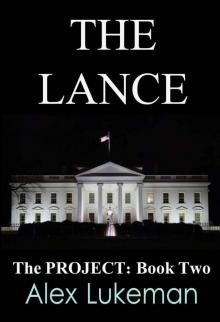 The Lance
The Lance The Last Option
The Last Option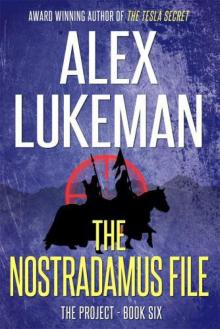 The Nostradamus File
The Nostradamus File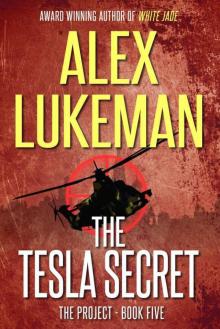 The Tesla Secret
The Tesla Secret